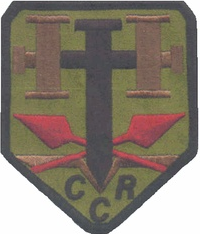Christian Patriot movement

The Christian Patriot movement is a subset within the broader American Patriot movement that promotes and emphasizes Christian nationalism as their core goal and philosophy. Like the larger movement, it promotes an interpretation of American history in which the federal government has turned against the ideas of liberty and natural rights expressed in the American Revolution.
Ideology[edit]
The movement originally referred to the Posse Comitatus, a far-right militia organization. The Posse Comitatus followed an ideology based on the teachings of William Potter Gale, who was also a Christian Identity minister, and the majority of the Christian Patriot movement's members still adhere to Christian Identity's white supremacist views.[1][2] This ideology holds the view that state and federal governments are agents of an arcane conspiracy to deprive Americans of their rights as "sovereign citizens." It also holds the view that this conspiracy can be undermined through various legal pleadings from English common law and other sources, such as a motion protesting the way a defendant's name is typeset in a legal complaint.[3] The ideology persists despite numerous court rulings that have declared its theories frivolous.[4]
Status[edit]
The movement grew during the 1990s after the Ruby Ridge and Waco Sieges appeared to confirm the suspicions of Christian Patriots.[5] The movement maintained its ties with the American militia movement of the same period. A highly publicized federal confrontation with Christian Patriots occurred in 1996, when Federal marshals arrested the Montana Freemen.[3]
In 2009, the Southern Poverty Law Center said that militia groups may be experiencing a "Patriot revival."[6]
See also[edit]
- Tea party movement
- Constitutional militia movement
- Miles Christianus
- Bo Gritz
- Gordon Kahl
- James Wesley Rawles
- Alex Jones
- American Redoubt
- Theoconservatism
- Jon Arthur
References[edit]
- ^ Eck, Diane (2001). A New Religious America: How a "Christian Country" has become the world's most religiously diverse nation. New York: HarperCollins Publishers. p. 347.
- ^ Buck, Christopher (2009). Religious Myths and Visions of America: How Minority Faiths Redefined America's World Role. Praeger. pp. 107, 108, 213. ISBN 978-0313359590.
- ^ a b Carey, Kevin (July 2008). "Too Weird for The Wire". Washington Monthly. Archived from the original on 2016-03-04. Retrieved 2008-07-19.
- ^ Sussman, Bernard J. Idiot Legal Arguments: A Casebook for Dealing with Extremist Legal Arguments. Anti-Defamation League. Archived from the original on 2007-09-10. Retrieved 2007-09-13.
{{cite book}}:|work=ignored (help) - ^ Anti-Defamation League, The Militia Movement Archived 2011-06-29 at the Wayback Machine
- ^ Keller, Larry (August 2009). "The Second Wave: Return of the Militias". A Special Report from the Southern Poverty Law Center. Montgomery, Alabama: 5–10. Retrieved September 12, 2013.
Further reading[edit]
- Aho, James (1995). The Politics of Righteousness: Idaho Christian Patriotism.
- Aho, James (2016). Far-Right Fantasy: A Sociology of American Religion and Politics. New York & London: Routledge, Imprint of Taylor & Francis Group. ISBN 978-1138962422.
- Durham, Martin (2000). The Christian Right, the Far Right and the Boundaries of American Conservatism.
- Gallaher, Carolyn (2003). On the Fault Line: Race, Class, and the American Patriot Movement. Lanham, Maryland: Rowman & Littlefield. ISBN 0-7425-1974-0. OCLC 845530800.
- Kushner, Harvey W (1998). The Future of Terrorism: Violence in the New Millennium.
- Martin, Gus (2006). Understanding Terrorism: Challenges, Perspectives, and Issues.
- Niewert, David A (1999). In God's Country: The Patriot Movement and the Pacific Northwest. Pullmam, Wash.: Washington State Univ. Press. ISBN 978-0-87422-175-6.
- Schlatter, Evelyn A (2006). Aryan Cowboys: White Supremacists and the Search for a New Frontier, 1970-2000.
- de Armond, Paul (1996). "Christian Patriots At War with the State".
